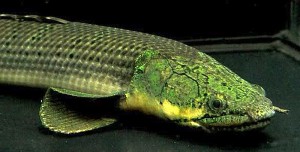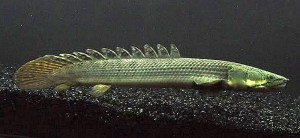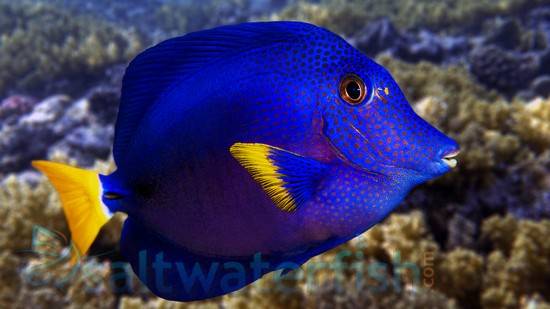The Weeksii Bichir (Polypterus weeksii) is also known to tropical fish keeping enthusiasts as the Mottled or Fatheaded Bichir. It is found in the Congo River basin in Central Africa and like others of the family Polypteridae, they have the ability to survive out of water for short periods of time provided they remain moist.
Like the Retropinnis Bichir (Polypterus retropinnis), they posses a modified paired swim bladder that has the function of “lungs”, as well as a set of gills. These fish can actually drown if they are unable to surface to take a gulp of atmospheric air.
Weeksii Bichirs are snakelike in appearance with a large head and a dorsal fin that merges with the caudal and anal fins. Their pectoral fins are used for crawling when out of water and for mobility when on the bottom of the aquarium.
They are greenish brown in color with black banding. Males have a thicker anal fin than females of the species and are usually a bit smaller.
Weeksii Bichirs are best housed in a densely planted, dimly lit aquarium, with a sandy or fine gravel substrate, a few pieces of driftwood, plenty of smooth rockwork in the form of caves to hide among, and plenty of bottom space. As juveniles they can be housed in a tank as small as 20 gallons but as they grow into adults, they will need a tank of at least 100 gallons.
Like most other Bichirs, the Weeksii Bichir is relatively peaceful with other large passive fish as long as there is plenty of open swimming space and a lot of dense cover. They are nocturnal feeders and should not be trusted with tank mates small enough to fit into their mouths. They get along well with other Polypterus of the same size but will squabble over food during feedings.
Polypterus weeksii are messy eaters, so a good filtration system and frequent partial water changes are a must. They are also “escape artists” and need a tight fitting tank cover with enough head space to allow them access to atmospheric oxygen.
Although breeding the Weeksii Bichir has not been recorded in an aquarium environment, their breeding habits are believed to be similar to that of other Polypterus species. During the rainy season, changes in temperature and water chemistry spark spawning behavior. These conditions are difficult to replicate in an aquarium but a large densely planted tank with soft, slightly acidic water and dim lighting may induce spawning behavior.
When ready to spawn, the male Mottled Bichir will chase and nudge the female until she submits. The male cups his anal and caudal fins around the female to receive her eggs which are immediately fertilized and scattered among the vegetation in the aquarium. The parents should be immediately removed from the tank at this point. The eggs hatch in 3 to 4 days and are free swimming about 3 to 4 days later. The fry are slow moving and should be fed newly hatched baby brine shrimp or microworms with an eye dropper until they are able to eat larger fare.
Adult Weeksii Bichirs are easy to feed and will generally accept a quality carnivore pellet or stick however, they prefer live or frozen foods such as mysis shrimp, brine shrimp, chopped beef heart, bloodworms, chunks of raw fish, earthworms, blackworms or fresh market shrimp. They should be fed once or twice a day as much as they can consume in five minutes.
Because they are a slow moving nocturnal species and have poor eyesight, feed Weeksii Bichirs in the evening just before turning off the light on your aquarium. They have a well developed sense of smell that gives them an advantage over their tank mates when eating at night.
Weeksii Bichirs are available on a seasonal basis from specialty tropical fish keeping shops and online, but they are not a common stock item in most shops. When available for sale they are usually about 3″ to 5″in length. Most are wild caught and could carry parasites or have infections so it is advisable to keep them isolated until given a clean bill of health.
Minimum Tank Size: 100 gallons
Care Level: Difficult
Temperament: Semi-aggressive
Aquarium Hardiness: Hardy
Water Conditions: 77-83° F, KH 1-12, pH 6.5-8.0
Max. Size: 22″
Color Form: Green, Tan
Diet: Carnivore
Compatibility: Keep with others of same size
Origin: Congo River basin in the Republic of Congo, Democratic Republic of Congo
Family: Polypteridae
Lifespan: 10 Years
Aquarist Experience Level: Intermediate



